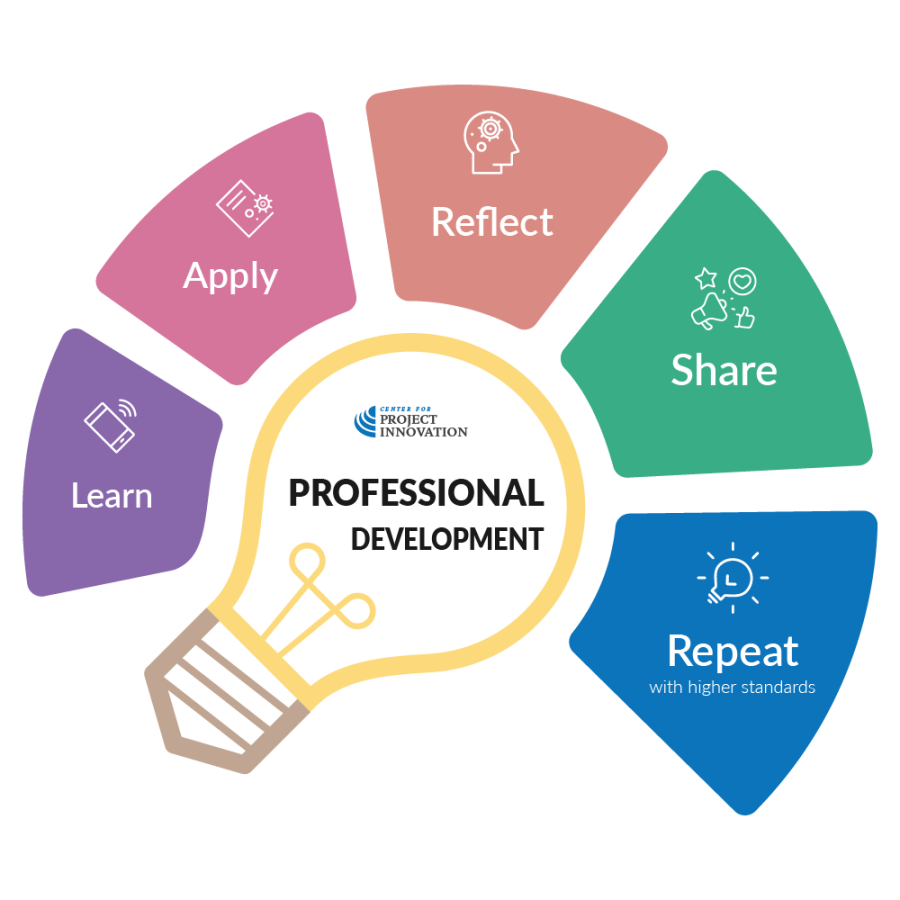Own your professional growth with simple strategies using the 70:20:10 model to stay relevant, confident, and ahead in project management.
Key terms
Professional development: Ongoing effort to build skills, confidence, and capability beyond what your current role strictly requires.
Continuous learning: Treating learning as part of everyday work rather than a one-off training event.
70:20:10 model: A guide that suggests capability develops through 70% experience, 20% exposure to others, and 10% formal education.
12.9.1: Why bother?
It’s easy to get comfortable and let professional development slide once you’re already employed.
If you already have a job and your employer isn’t demanding extra qualifications or training, it can be tempting to do only what’s required.
But relying on your current skills is a short-term strategy—projects evolve, industries shift, and expectations rise, whether we prepare for them or not.
Taking charge of your own development isn’t just about career ambition; it’s about staying relevant and confident in a rapidly changing environment.
If you don’t intentionally grow your skills and experience, you risk falling behind your peers, which becomes a serious disadvantage when opportunities arise or roles change.
This challenge is even more pronounced in project environments. Project managers often move between organizations or contract roles more frequently than other professionals, which means employers may be reluctant to invest heavily in development they fear will walk out the door.
Ironically, research consistently shows that organizations that invest in development retain their best people for longer—but not every employer has the budget or mindset to do so.
That leaves one clear reality: you must own your development.
Whether support is available or not, your growth cannot be left to chance or dependent on a single employer’s training policy.
A culture of project excellence is built not just on good process, but on professionals who see learning as part of the work—not an optional extra when time permits.
But if you’ve made it this far in this course, you already know that!
12.9.2: The 70:20:10 rule of learning
In 2000, Lombardo and Eichinger introduced what became known as the 70:20:10 learning model, a simple way to understand how professional capability develops.
It suggests that effective growth happens through a mix of experience (70%), exposure to others (20%), and formal education (10%).
All three matter in building strong project managers and should be deliberately built into your capability development approach.
Education (formal learning) – 10%
Formal learning only accounts for around 10% of professional development, but it still plays an important role—it gives project managers the language, structure, and conceptual frameworks needed to make sense of what they see in real projects.
Courses, certifications, and structured learning modules create a foundation of shared terminology and help align teams around consistent ways of working.
This could include formal project management qualifications, short professional workshops, or well-designed online programs (like this one!).
Even internal training—like learning how your organization expects templates, risk logs, or governance gateways to be used—falls into this category.
While formal learning alone won’t make someone an effective project manager, it establishes a common baseline of knowledge that makes collaborative delivery and continuous improvement possible.
Exposure (social learning) – 20%
Around 20% of professional development comes from exposure to how other people think and operate in real project environments.
Unlike formal training, social learning is informal, conversational, and often unexpected—it happens when you listen to how a sponsor frames a decision, hear a peer explain a stakeholder win, or read a case study that challenges your default way of working.
For project managers, this might involve joining industry forums, tuning into webinars, or following respected voices in the project management space to stay current with evolving practices.
It can also be as simple as asking a more experienced colleague, “How would you approach this?” or sitting in on a steering meeting just to observe the language and pace of governance decision-making.
Participating in communities of practice—whether online or in person—creates a rhythm of ongoing peer learning rather than relying on occasional training events.
Finding mentors or contributing your own content or reflections also deepens this exposure, as teaching others often clarifies your own thinking.
Social learning speeds up capability growth by allowing you to borrow insight from others instead of learning every lesson the old-fashioned way.
Experience (applied learning) – 70%
The largest portion of professional growth—around 70%—comes from doing the work itself.
Project management is a practice discipline, and most capability is built by applying tools and judgment in real project environments where things don’t always go to plan.
Taking on new or challenging assignments, stepping into unfamiliar project types, or volunteering for tasks outside your comfort zone accelerates development because it forces you to translate theory into action.
Experience only turns into learning, however, when it is intentional. Simply repeating the same tasks in the same way does not build capability—consciously applying new techniques, experimenting with different approaches, and observing the impact of your decisions is what leads to growth.
Active reflection and feedback multiply the value of experience.
Seeking input from peers, sponsors, or even stakeholders after a milestone or engagement helps reveal blind spots and refine your practice.
Collaborating on improvements to templates, checklists, or governance flow also builds systems-level thinking and shifts your mindset from “project participant” to “project professional.”
Sharing what you’ve learned and mentoring others is also part of this 70%, because teaching forces you to articulate your thinking clearly and exposes any areas where your understanding is still shaky.
There’s a saying that you don’t truly understand something until you can explain it simply to someone else—this holds especially true in project management.
When you guide a colleague through a risk process, show someone how to negotiate a scope conversation, or help a junior team member interpret governance expectations, you are not just supporting them—you are reinforcing and refining your own capability.
Teaching turns implicit knowledge into conscious practice, making it easier to repeat consistently on future projects.
In a culture of project excellence, experience is not just something that happens to you; it is something you work with deliberately to improve how you deliver.
12.9.3: Make it happen
Professional development follows a pattern known as the Four Levels of Competence:
- Unconscious incompetence – You don’t yet know what you don’t know. Confidence is often high, but awareness is low.
- Conscious incompetence – You start to recognize gaps in your ability and can name areas where you need to improve. This is where real learning begins.
- Conscious competence – You can perform well, but it still requires effort, attention, and deliberate application of process.
- Unconscious competence – The skill becomes part of your natural operating rhythm. You perform it well even under pressure because it’s now embedded, not just remembered.
Most project professionals move between levels two and three throughout their careers.
The transition to level four—professional fluency—doesn’t happen automatically with time served. It happens through deliberate capability building, reflection, feedback, and teaching others.
This is where aligning your personal development with your organization’s goals becomes powerful.
Rather than waiting for a generic training program to be offered, you can take ownership by presenting your own development plan—and in many cases, this is what prompts employers to fund or support it.
When you frame your learning as something that improves project outcomes and strengthens the organization’s capability, support becomes easier to secure.
To move forward, treat your career like a project—SWOT-analyze yourself, identify priority gaps, and design small, controlled experiments to build skill.
Start simple, then increase complexity.
Volunteer to apply what you’re learning, whether inside your organization or through community and professional networks.
Experience only becomes growth when it is applied intentionally and reflected on.
However, you should always be mindful of the limitations of purely self-paced online learning. While courses (like this one) provide structure and language, competence is built in conversation with others, through feedback, challenge, and shared practice.
You don’t become a true project leader by ticking modules—you become one by using what you know in real environments and then lifting others with you.
Standing still is not staying safe—it is quietly falling behind.
Growth in project practice is active, social, iterative, and purposeful.
The cycle is simple but powerful:
Learn it → Apply it → Reflect on it → Share it → Repeat, with higher standards.






